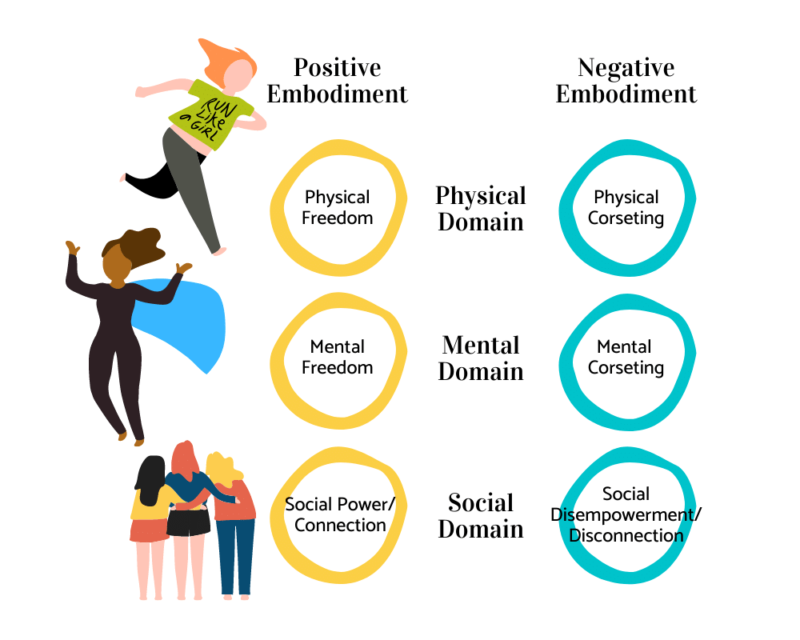
I know you’re familiar with the terms “body image” and “body positivity.” Why? Because they are everywhere—so much so that the terms have become coopted by advertisers and social media influencers who think body positivity means not minding having a teeny tiny flesh roll when you bend waaaaaay over to the side.
One of the issues I see with the idea of cultivating body positivity and better body image is that these concepts are largely based on how you feel about how your body looks. How at peace you are with your size, your shape, your wrinkles, your cellulite. There’s an inherent externalness about it, a positioning of your body as an object upon which you and others gaze. Do we women really need to objectify ourselves more than we already are in our society? I don’t think so.
Enter embodiment. What is embodiment? It’s about your experience in your body. That makes it an internal experience, with your body as the subject, not an object.
Just like you can have “good body image” or “bad body image,” you can have positive experiences of embodiment and negative experiences of embodiment. This is a little tricky to explain, so I’m going to go with some examples that illustrate this idea. (Note: you might wonder about “corseting” in the illustration below. It’s essentially the opposite of “freedom.”)

Examples of embodiment
Positive Embodiment:
- Freedom to engage in enjoyable physical activities
- Freedom to move and take up space
- Safety from physical/sexual violence or abuse
- Freedom from coercive body alterations and practices
- Care of the body
- Freedom of desire
- Having a critical stance towards ideas about how women are “supposed to” look and behave
- Freedom from prejudice and harassment
- Social power is based on engagement in meaningful pursuits and tuning in to one’s needs
- Empowering relationships
- Being a part of equitable communities
Negative Embodiment:
- Blocked from engagement in physical activities
- Constriction of movement and physical space (trying to appear smaller, wearing constricting clothing or footwear that makes it hard to walk)
- Exposure to physical/sexual violence or abuse
- Engagement in coercive body alterations and practices (dieting, plastic surgery, refusing to leave the house with out makeup…ever)
- Neglect of body care
- Restriction of desire (this includes restriction of any of our “appetites”)
- Internalization of the status quo, including ideas that women’s bodies are deficient and are object for the male gaze, as well as ideas that women should be submissive or demure and engage in only “feminine” activities
- Exposure to prejudice and harassment
- Social power is primarily based on appearance (which can be fleeting), with a lack of attunement to one’s needs
- Disempowering relationships
- Part of inequitable communities (or no community at all)

The power of the body story
I was recently doing some professional training on embodiment with Elizabeth Scott, a psychotherapist and co-founder of The Body Positive. (I’m also a licensed Be Body Positive facilitator.) One part of our homework was to write our body story. It was a powerful experience to see the interplay between the positive and the negative played out, especially when a negative experience could have easily lead to a downward spiral, but a positive experience helped me be resilient.
I’m starting to have my 1-on-1 clients write their body stories, after seeing just how powerful it can be. We are complex creatures, and things that happened to our bodies, or messages we received about our bodies, years or decades ago can affect our relationships with food, movement and self-care today. Those connections often become clearer when we take pen to paper, or fingers to keyboard.
- If you want to write your own body story, start with your earliest memories of having a body. Include:
- Messages you received about your body (whether directly or absorbed by osmosis from observing those around you and exposure to media)
- The ways you did and didn’t have freedom to move through the world and express your authentic self
- Feelings and beliefs you developed about your body
- Ways in which you felt total ownership/agency of your body, or conversely ways in which that agency was taken away
- Things you did or (didn’t) do to try to change your body (for example, did you participate in diet culture?)
Prefer to draw your body story? Get my free worksheet!
Embodiment and Intuitive Eating
You might be wondering how Intuitive Eating fits into the idea of embodiment. Very neatly, as it so happens. Intuitive eaters honor their hunger, respect their fullness, seek satisfaction from their food, reject the diet mentality, and engage in enjoyable physical activity. All of those are very embodied activities.
Intuitive eaters’ attunement to their physical needs for food, movement and self-care often spills over into the rest of their lives, allowing them to assert their needs and boundaries. When we can tune into our internal body states and sensations, it’s easier to meet both our physical and emotional needs. When we trust our bodies and feel connected to them (rather than feeling disconnected at the neck), we are embodied. When we choose food and movement and friends and partners based on what feels good and true and right in our bodies, rather than based on surface appearances or societal “shoulds,” we are embodied.
And that’s a beautiful thing.
I have a client who enjoys walking, but finds it hard to motivate herself to walk when her walking doesn’t have a purpose (like running errands). That’s harder to do nowadays, thanks to the pandemic. She associated walking without a destination with episodes from her childhood when she needed to escape her house. During a recent session, she shared a breakthrough with me. She has been working on eating more intuitively, and as part of the process of listening to her body, she started to notice that sometimes, her body was actually telling her that it wanted to go for a walk, that it wanted to MOVE. So now, when her body says “let’s walk,” she listens, and is finding the experience very enjoyable. She is fully IN her body.

So, where do you go from here?
So what do you do if you know, with or without actually writing your body story, that you’re not positively embodied?
- Maybe you have a history of physical trauma.
- Maybe you loved sports as a young girl, but you abandoned that joy when you hit puberty and “learned” that girls weren’t supposed to be sporty and never managed to reclaim that joy as an adult.
- Maybe you’ve spend more than half your life dieting and hating your body and don’t know how to stop that train.
Please don’t do nothing! Write (or draw) your body story, being gentle with yourself if it includes a history of trauma.

There are two excellent books that can guide you. The first, “Embody: Learning to Love Your Unique Body (and quite that critical voice)” is written by Connie Sobczak, the other co-founder of The Body Positive. The Body Positive is largely based on the idea of embodiment. This book has actionable tips.

The second book is “Journeys of Embodiment at the Intersection of Body and Culture: The Developmental Theory of Embodiment” by University of Toronto researcher Niva Piran. This book is more academic, but full of narrative samples from the 171 girls and women Piran interviewed about their experiences with embodiment.
If you need more help, seek out a therapist or registered dietitian who has experience with Intuitive Eating and Health At Every Size, and who is weight-inclusive (i.e., they don’t hold biases based on body size). Contact me if you’d like to know more.
This post contains Amazon Affiliate links. As an Amazon Associate I earn from qualifying purchases.
Disclaimer: All information provided here is of a general nature and is furnished only for educational purposes. This information is not to be taken as medical or other health advice pertaining to an individual’s specific health or medical condition. You agree that the use of this information is at your own risk.
Hi, I’m Carrie Dennett, MPH, RDN, a weight-inclusive registered dietitian, nutrition therapist and body image counselor. I offer compassionate, individualized care for adults of all ages, shapes, sizes and genders who want to break free from eating disorders, disordered eating or chronic dieting. If you need to learn how to manage IBS symptoms with food, or improve your nutrition and lifestyle habits to help manage a current health concern or simply support your overall health and well-being, I help people with that, too.
Need 1-on-1 help for your nutrition, eating, or body image concerns? Schedule a free 20-minute Discovery Call to talk about how I can help you and explore if we’re a good fit! I’m in-network with Regence BCBS, FirstChoice Health and Providence Health Plan, and can bill Blue Cross and/or Blue Shield insurances in many states. If I don’t take your insurance, I can help you seek reimbursement on your own. To learn more, explore my insurance and services areas page.






